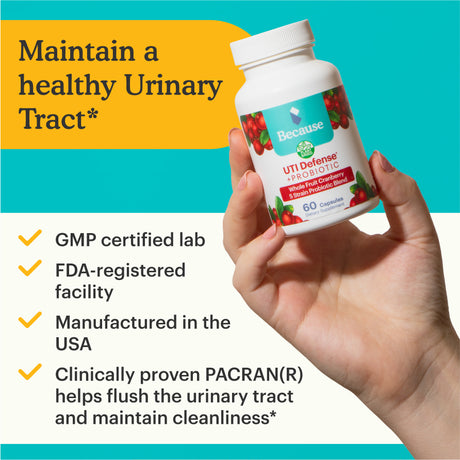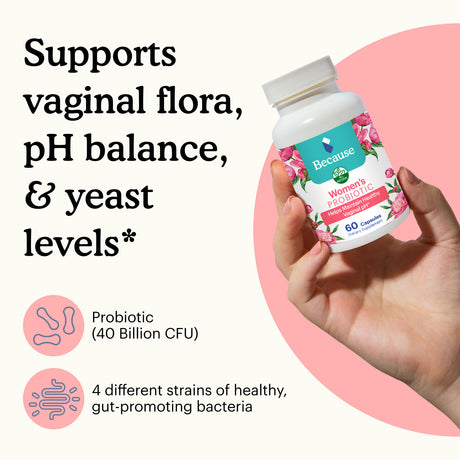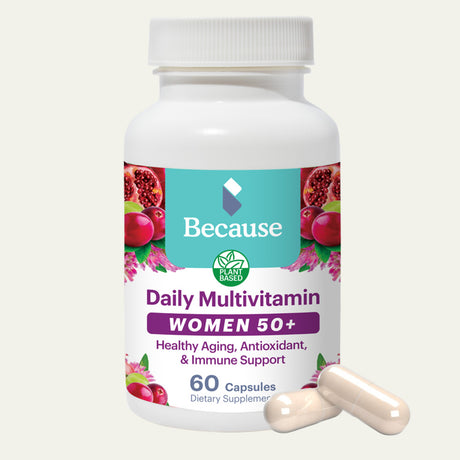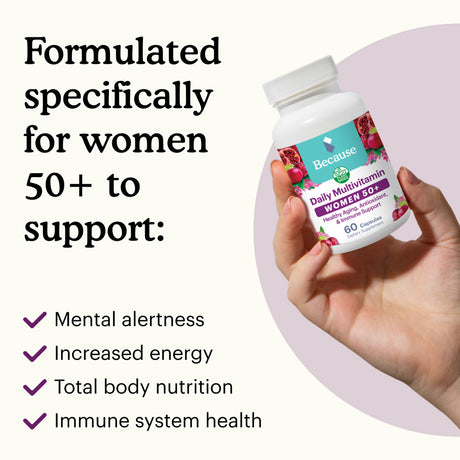What is Urinary Incontinence?
Urinary incontinence is the inability to hold in your urine. It’s a common problem in people of all ages, but is especially common in older adults. It affects women nearly twice as much as men because of things like childbirth and menopause, which affect the pelvic floor muscles and reduce bladder control.
What Causes Urinary Incontinence and How Can Natural Remedies Help?
Urinary incontinence falls into three general categories: stress incontinence, urge incontinence, and functional incontinence.
Stress incontinence happens when the muscles that support your bladder or urethra are damaged or lose function, making it difficult or impossible to hold in urine. This often happens as we age, after childbirth, or after injuries or surgery.
Urge incontinence is when you have frequent urges to urinate. This is usually caused by overactive bladder—spasms in the muscles surrounding the bladder—but it can also be a psychological urge that persists after an illness or injury.
Functional incontinence refers to incontinence that happens not because of bladder dysfunction but rather because you were unable to get to the bathroom in time. This is usually related to mobility issues or being in an non-accessible space. This isn’t an easy problem to manage, but asking staff for where the nearest accessible toilets are when you go into public spaces and setting up toilet alternatives for at-home use (like bedside commodes) can help.
If you have stress or urge incontinence, you may think that it’s inevitable or irreversible. In fact, there are many natural remedies that can improve your symptoms. Along with talking to your doctor to find out if there is an underlying health condition that could be causing your incontinence, try these natural incontinence remedies to reduce your symptoms and improve your daily life.
The Best Natural Remedies for Urinary Incontinence

If you’re looking for extra support managing your incontinence, there are certain supplements that you may want to try. Below are some of the most popular supplements used by people with incontinence. Remember to talk to your doctor before starting any dietary supplement, as they can sometimes interact with or inhibit other medications you are taking.
Magnesium
Magnesium has been shown to reduce muscle spasms, which helps with urge incontinence both by reducing how frequently you feel the urge to go and by reducing the number of sudden and unexpected leaks.
Pumpkin Seed Extract
Pumpkin seed strengthens your bladder muscles and nourishes your urinary tract, helping your urinary system stay supple and strong and letting you have fewer leaks due to stress incontinence.
If you want to both strengthen your bladder and reduce muscle spasms, try Because Market’s Bladder Strength Daily Supplement. It combines pumpkin seed extract and soybean germ extract to strengthen bladder muscles and increase bladder capacity with magnesium to calm an overactive bladder.
Vitamin D
Vitamin D deficiency is common in older adults. This can affect muscle strength, including the pelvic floor muscles. Vitamin D supplements have been shown to significantly reduce urinary incontinence in controlled clinical trials, so if you have stress incontinence make sure you add a Vitamin D supplement to your daily routine.
CBD
CBD is the non-psychoactive component of hemp extract, which means it relaxes you without causing a “high” feeling. It is thought to reduce incontinence by reducing the spasms of the detrusor muscles (the muscles around your bladder that tell you you need to go).
Current research is mixed on the effectiveness of CBD as a direct treatment for incontinence; however, we know that CBD reduces inflammation and pain, which both work indirectly to reduce muscle spasms and urges to urinate. If you decide to try CBD, start with a low dose and buy from a reputable source. Because Market has a range of natural CBD products that you can try to get started.
Capsaicin
Capsaicin helps with incontinence by reducing pelvic pain. Many women experience pelvic pain after childbirth or during menopause, and this discomfort can cause muscle contractions that lead to incontinence. By reducing pain, capsaicin can help to calm an overactive bladder and reduce incontinence.
Herbal Remedies
Many herbs have not been studied enough to know what effects they have on urine leakage. However, two traditional medicines, Gosha-jinki-gan and Hachi-mi-jio-gan, have been studied in small groups of people, and may improve quality of life and reduce the sense of urgency around urinating. Because of possible side effects, including nausea and inhibiting the effectiveness of some medications, tell your doctor before you start taking any herbal supplements.
Lifestyle Changes for Incontinence
Behavioral changes can significantly reduce incontinence in about 70% of cases, so in addition to taking supplements or medication, your doctor may prescribe some of the following lifestyle treatments.
Bladder Retraining
Bladder retraining is one of the best natural remedies for urge incontinence, and is simple to begin. Start by keeping a bladder diary. Write down what you eat and drink, when you need to use the restroom, and when you actually go, and take note of whether certain foods or drinks are associated with more urges to pee. Gradually, you can increase the time between when you feel the urge to go and when you actually go. You can also start scheduling your bathroom trips (e.g. if you normally go every hour, try to increase that time and go even when you don’t need to pee). This will also help to retrain your bladder, so there is less urgency around finding the restroom the moment you feel the urge to go. Talk to your doctor about the training program and timing that is best for you.
Pelvic floor therapy
Pelvic floor therapy can be life-changing for women who have stress incontinence, especially after giving birth or after menopause. Kegel exercises, squats, and bridges are all simple forms of pelvic floor therapy that you can do at home to strengthen your pelvic muscles and reduce leaks. For the best results, talk to a pelvic floor therapist who will go through your symptoms with you and design a plan that will make you healthier, reduce pain, and stop those dribbles every time you sneeze.
Watch your liquid intake
You may think that drinking less water is the best way to decrease leaks; however, this can actually cause your incontinence to get worse by decreasing the capacity of your bladder (which leads to more urge incontinence) and by causing dehydration, which leads to constipation and extra strain on your pelvic floor muscles, thereby exacerbating your stress incontinence.
Drink mostly water, avoid carbonated beverages and caffeine if you can, since these irritate your bladder, and try to space out your liquid intake throughout the day to make sure you stay hydrated without putting any sudden strain on your bladder from a large intake of liquid.
You might also want to stop drinking liquids a few hours before bed to limit nighttime leaks, but check with your doctor if this is a good option for you.
Acupuncture
Acupuncture may also help some adults with overactive bladder by reducing muscle spasms, decreasing pain, and strengthening the detrusor muscles, but there isn’t enough evidence yet about whether it works, so it should be considered a supplemental treatment. Acupuncture might
Strategies for Nighttime Incontinence

If you wake up several times per night to go to the bathroom, you know the struggles of nighttime incontinence. This can be especially dangerous as we get older because of the risk of falls and injuries. To get a better night’s sleep, try the following steps:
Limit caffeine and alcohol before bed
In addition to the lifestyle and natural therapies mentioned above, you should also cut out all caffeine and alcohol for a few hours before bed. Caffeine can irritate your bladder and increase urge incontinence, while alcohol is a diuretic, which causes your body to create more urine. Stopping these a few hours before bed will reduce your risk of leaks and overnight trips to the bathroom.
Take urinary health supplements
Supplements like Because Market’s UTI Defense supplement help protect against infection and maintain urinary tract health even when you do have leaks and wetness. Along with supplements that strengthen your bladder muscles and reduce muscle spasms to prevent leaks, urinary health supplements let you sleep with confidence.
Wear overnight incontinence underwear
For extra protection in case of leaks, consider also wearing a nighttime incontinence product like Because Market’s Premium Overnight Plus underwear. Use our Fit Quiz to find the best option for you.
Combining Natural Remedies for Incontinence with Conventional Treatments
Why use conventional treatments?
Natural therapies are an important tool for managing incontinence, but many people will also benefit from using conventional remedies like medications or injections to reinforce your urethral muscles. These can also reduce your urge to urinate while you practice all of the lifestyle treatments like kegels and bladder retraining. If you are struggling to manage your incontinence, talk to your doctor about what treatments are right for you.
Is it safe to combine conventional and natural treatments?
Yes! Even if you’re using a conventional medical treatment for your incontinence, you should keep practicing the behavioral changes you have started: a 2019 systematic review found that the combination of behavioral treatments and medical treatments was more effective than medical treatments alone in treating both stress incontinence and urgency incontinence.
By strengthening your pelvic floor muscles, retraining your bladder, and taking supplements and medications prescribed by your doctor, you can significantly improve your bladder control and worry less about unexpected bladder leaks. Because Market can help you get there with natural remedies and supplements designed to help you maintain a healthy, strong bladder and urinary system.
If you're struggling with incontinence, join one of our private support groups today!
Women's Incontinence Support Group
Men's Incontinence Support Group
Sources:
Office on Women's Health. (n.d.). Urinary Incontinence. https://www.womenshealth.gov/a-z-topics/urinary-incontinence
National Center for Biotechnology Information (NCBI). (2019). Urinary Incontinence in Women: Evaluation and Management. https://www.ncbi.nlm.nih.gov/books/NBK559095/
National Association for Continence (NAFC). (n.d.). Overactive Bladder. https://nafc.org/overactive-bladder/
BMC Women's Health. (2022). Risk Factors for Urinary Incontinence in Women: A Systematic Review and Meta-Analysis. https://bmcwomenshealth.biomedcentral.com/articles/10.1186/s12905-022-02024-1
Frontiers in Pharmacology. (2021). Advances in the Management of Overactive Bladder Syndrome: What's New? https://www.frontiersin.org/articles/10.3389/fphar.2021.708989/full
National Center for Biotechnology Information (NCBI). (2013). Behavioral Interventions for Urinary Incontinence in Women: A Systematic Review for an American College of Physicians Clinical Practice Guideline. https://www.ncbi.nlm.nih.gov/pmc/articles/PMC3821987/
Harvard Health Publishing. (2019). 4 Behavioral Changes to Tame Urinary Incontinence. https://www.health.harvard.edu/blog/4-behavioral-changes-to-tame-urinary-incontinence-2019071017201
National Association for Continence (NAFC). (n.d.). Bladder Retraining. https://nafc.org/bladder-retraining/
American College of Physicians. (2019). Pharmacologic Treatment of Urgency Urinary Incontinence in Women: A Systematic Review and Meta-analysis. https://www.acpjournals.org/doi/10.7326/M18-3227?sf210306884=1














